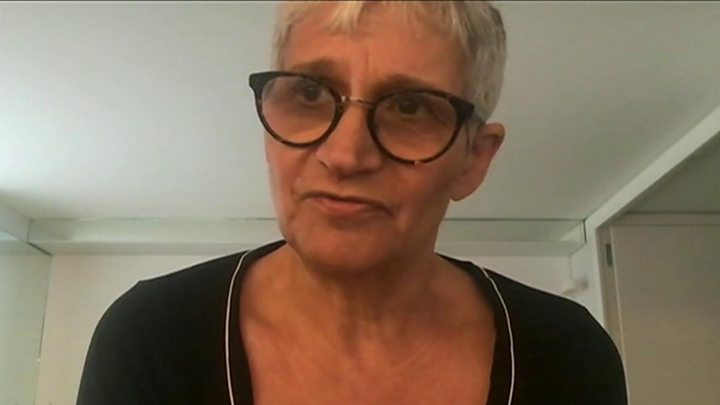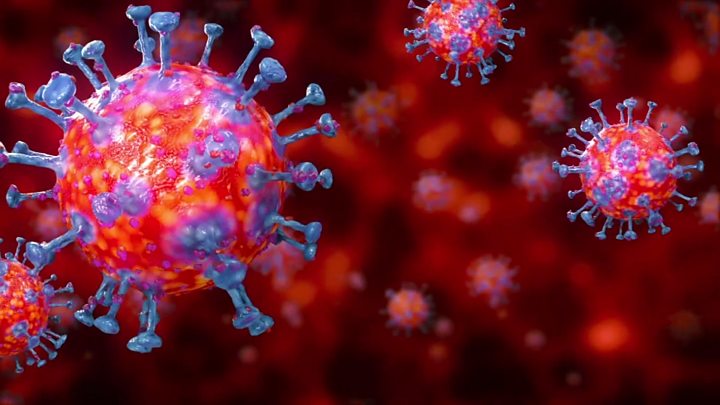Ten more people in the UK have died in the last 24 hours after testing positive for coronavirus, bringing the total number of deaths to 21.
The UK government's chief medical adviser said the patients were all in "at-risk" groups from across England.
The total number of confirmed cases in the UK has reached 1,140 while 37,746 people have been tested.
It comes as the government revealed plans to boost the number of NHS beds and ventilators to treat people.
British manufacturing companies are to be tasked with increasing the production of ventilators and other medical equipment, while the NHS could also buy up thousands of beds in private hospitals.
In a conference call with manufacturers on Monday, Prime Minister Boris Johnson will urge them to join a "national effort" to tackle the virus.
Downing Street says it has already been working with suppliers in the UK and abroad to increase the nation's supply of ventilators.
Earlier, the Labour Party and GMB union called for the government to use empty beds in "plush private hospitals" to ease the pressure on the NHS.
It comes as Prof Chris Whitty, the UK government's chief medical adviser, warned that facilities for people needing oxygen and critical care beds would be the parts of the NHS that will come under pressure first as the scale of the outbreak increases.
Meanwhile, US President Donald Trump decided to suspend all travel between the US and the UK and Ireland.
A No 10 spokesman said Mr Johnson had since spoken to Mr Trump, and set out the "science-led approach" the UK is taking.
During their conversation, the two leaders also agreed on the "importance" of international collaboration to fast-track the development of a vaccine.
It comes as France ordered non-essential locations used by the public to close, and asked citizens to go out as little as possible. Several European countries have closed their borders or shut their airports.
US vice president Mike Pence said the ban would begin at midnight on Monday eastern standard time (04:00 GMT), following a "unanimous recommendation" from health experts.
The US has already banned travel from 26 European countries.
Of the latest deaths in the UK, eight were men aged over 80 and all were in "at-risk" groups.
They were being treated in hospitals in Buckinghamshire, Birmingham, Wolverhampton, Leicester, London and Chester.
Prof Whitty said: "I understand this increase in the number of deaths linked to Covid-19 will be a cause for concern for many. The public should know every measure we are taking is seeking to save lives and protect the most vulnerable."
Most of the confirmed UK cases are in England. There have been 121 confirmed cases in Scotland, 60 in Wales and 34 in Northern Ireland.
What do I do if I...
Have symptoms: If you are experiencing a new, continuous cough and/or a fever - defined as a temperature of above 37.8C - you should self-isolate at home for at least seven days, according to guidance released on Friday by Public Health England (PHE).
People with mild symptoms who are self-isolating at home are not currently being tested. All hospital patients with flu-like symptoms are being tested.
Live with or been in close contact with a positive case: The seven day isolation period now applies to everyone regardless of where you might have travelled or if you have had close contact with a confirmed case.
People who are self-isolating with mild symptoms are no longer being tested for the virus. The government said on Friday it estimated the true number of UK cases to be around 5,000 to 10,000.
The PM has been meeting with officials at Downing Street to discuss the pandemic.
A mother and her newborn baby are among the latest confirmed to have the virus in England.
Medics are trying to confirm whether the baby, who was tested at North Middlesex Hospital, was infected during birth or before, according to the Sun newspaper.
The Royal College of Obstetricians and Gynaecologists said there was no evidence the virus can be passed on from pregnant women to babies before birth, but that due to how little is known about the new virus it would continue to update its guidance.
Government advice adds there is "no clinical evidence" to suggest the virus can be transmitted through breast milk.
"Infection can be spread to the baby in the same way as to anyone in close contact with you," it says.
The increase in deaths is obviously alarming for the public - as well as being a tragedy for the families involved.
What we don't know is the extent to which coronavirus played a role in their deaths.
We only know they had it when they died.
Every patient death announced in the coronavirus outbreak in the UK has been a person who has had underlying health conditions.
That is a term that covers a range of different illnesses from heart disease and diabetes to asthma.
There is certainly transmission of the virus within hospital - on Thursday three quarters of those patients with coronavirus in intensive care had not been abroad to an affected country.
They may have caught it in the community and the Covid-19 illness they developed lead to their admission or they could have caught it in hospital when they were already ill.
There are more than 1,500 deaths a day in the UK on average and what is certain is that growing numbers of people who die are going to have tested positive for coronavirus.
People visiting elderly and vulnerable relatives have been reminded to take extra care, after the government released new advice.
Care home providers should ask anyone who is "generally unwell" not to visit, the advice says.
Meanwhile, government sources said mass gatherings might soon be banned in the UK to ease pressure on emergency services. It is thought a ban could take effect as early as next weekend.

Media playback is unsupported on your device
Events still set to go ahead include the Grand National in April, the 75th anniversary VE Day commemorations and Chelsea Flower Show in May, and Glastonbury Festival in June.
The increase in cases in the UK comes as people continue to stockpile food and household items. The government has said there was "no need" for people to do so but has also relaxed restrictions on delivery hours for shops to make sure they remain stocked.
Online supermarket Ocado has taken its app offline due to "performance issues driven by continued high demand" while the website has crashed for many users.
Former MP Luciana Berger called for members of the public to "look out for" each other after she said she witnessed a man in a London supermarket refusing to give an elderly lady one of his packets of pasta.
She said the incident, which she posted about on Twitter, was "very upsetting".
Meanwhile British holidaymakers face being stranded abroad as Spain is set to begin a two-week state of emergency, with bars, restaurants, shops and activities all closed.
Seven Jet2 planes heading to Spain were turned around in mid-air as the airline cancelled all flights to the mainland, Balearic Islands and the Canary Islands. The firm says it has suspended all holidays and flights to all of Spain for at least a week.
The Foreign and Commonwealth Office (FCO) has advised against all but essential travel to parts of Spain as well as the whole of Poland.
The Polish government is closing all its borders for 10 days at midnight. Some non-Polish nationals - such as spouses or children of Polish nationals - will still be allowed to enter the country,
All flights to and from Poland by airlines in the Ryanair group have been cancelled from midnight on Saturday to midnight on 31 March.

Media playback is unsupported on your device
In other developments:
- Benefit claimants who can't attend reassessments or job centre appointments because they are self-isolating or are infected by coronavirus will not be sanctioned provided they make this clear in good time, the Department for Work and Pensions (DWP) says
- British couple David and Sally Abel, who both tested positive for the virus on board the quarantined Diamond Princess cruise ship, have returned to the UK, after recovering in a Japanese hospital
- Brittany Ferries is stopping its services from Portsmouth to Le Havre, in France, and to Spain. Its sailings from Poole will be for freight only and will not take any passengers
- All Apple stores outside of what the tech giant calls "Greater China" - that is China, Macau, Hong Kong and Taiwan - have been closed for two weeks. The tech giant reopened all 42 of its Chinese stores on Friday after they were closed for a month, causing a huge drop in iPhone sales
- Catholic churches are preparing for the possibility they might have to suspend the celebration of Mass
- Most of the world's major sporting events have been postponed or cancelled because of the pandemic, including the Edinburgh Marathon and the London Landmarks Half Marathon.
- Bath's annual half marathon is going ahead on Sunday despite local MP Wera Hobhouse saying it should be cancelled. Organisers said it is "now too late to cancel or postpone the event"
- The National Education Union has written to the prime minister to ask why the government has decided not to shut schools to help reduce the spread of the virus and asking for "fuller disclosure" of the models it has used during its decision-making process
Have you been affected by the coronavirus? Share your experiences by emailing haveyoursay@bbc.co.uk.
Please include a contact number if you are willing to speak to a BBC journalist. You can also contact us in the following ways:
- WhatsApp: +44 7756 165803
- Tweet: @BBC_HaveYourSay
- Please read our terms & conditions and privacy policy
https://news.google.com/__i/rss/rd/articles/CBMiJGh0dHBzOi8vd3d3LmJiYy5jb20vbmV3cy91ay01MTg4OTk1N9IBKGh0dHBzOi8vd3d3LmJiYy5jb20vbmV3cy9hbXAvdWstNTE4ODk5NTc?oc=5
2020-03-15 14:59:59Z
52780665394039
Tidak ada komentar:
Posting Komentar